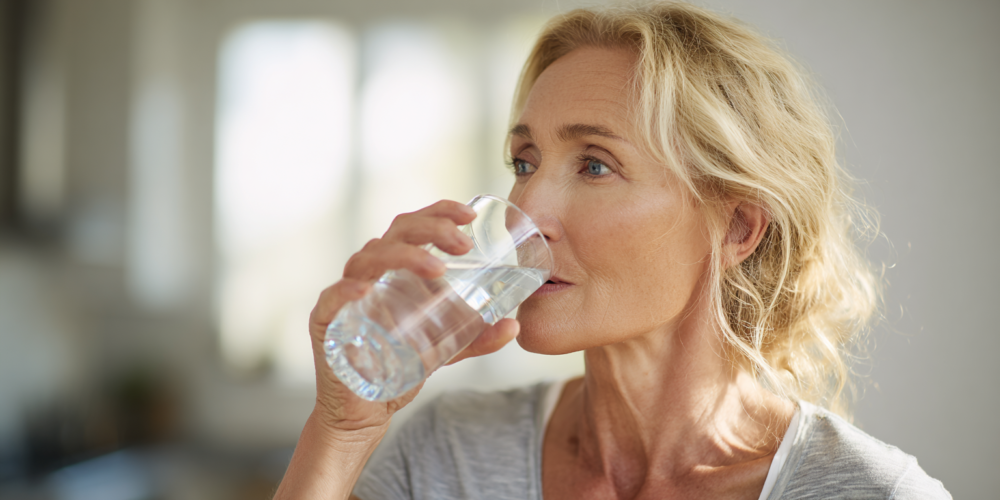
Have you ever noticed that older people sometimes have a distinct smell, even if they keep themselves clean? This “old person smell” is a real thing, and it has a scientific reason behind it! The good news is that you can do something about it. This article will explain what causes this smell and give you 5 simple ways to get rid of it, helping bring back comfort and confidence. (Based on the expertise of cardiologist, Dr. Andre Wambier)
📌The “Old Person Smell”: What’s Going On?

First off, let’s get one thing straight: getting older doesn’t mean you’re going to smell bad or that you’re not clean. Many older folks take great care of themselves. What happens is that our bodies change as we get older, especially after age 60 or 70. These natural changes can, in fact, change how our bodies smell.
So, what’s the main reason for this “age smell”? It’s not mothballs, that’s for sure! Studies done in Japan found a compound called 2-Nonenal. This is a substance that naturally shows up on our skin when the fats (lipids) on our skin go through a process called oxidation. Think of it like rust forming on metal, but it’s happening to the fat on your skin. As we get older, two main things happen:
- The makeup of these fats on our skin changes.
- Our natural antioxidants, which fight this “rusting” process, go down.
What’s the result? More oxidation, which means more 2-Nonenal is made. This compound has a typical smell, often described as a bit greasy, or like old grass or cardboard. And the tricky part is, it doesn’t easily wash away with just regular soap and water because it sticks to the skin and even to clothes!
👉Other Things That Can Make Body Odor Worse

It’s not just 2-Nonenal, though! Other things can make body odors different or stronger:
- What You Eat: Foods with strong smells (like garlic, onion, curry), too much red meat, or fried foods can play a role.
- Medicines: Some medicines can change how your sweat or skin smells as a side effect. For example, some antidepressants might cause a metallic or sour smell. Blood pressure medicines, like diuretics, can sometimes lead to a chemical smell by changing the balance of salts in your body. Even high doses of certain vitamins, like B1, can change sweat smell.
- Health Problems: Uncontrolled diabetes can give breath a sweet, acetone-like smell. Kidney problems might cause an ammonia smell, and liver issues can lead to a “fishy” smell.
- Cleaning Habits: Sometimes, it’s hard for older people to move around as easily, which can make it tough to clean certain areas well. This can make smells worse.
- Not Drinking Enough Water: If you don’t drink enough water, toxins get more concentrated in your sweat and urine, making any smell much stronger.
Now that you know what causes these smells, let’s get to the 5 ways to deal with them and keep things smelling fresh!
⚙️5 Ways to Deal with Body Odor in Older People
➡️TRICK #5: Super Detailed Cleaning

It’s not enough to just quickly wash up in the shower. As we get older, skin gets thinner, and moving around might get harder. Some hidden spots can collect more sweat, germs, and that 2-Nonenal stuff. You need to pay extra attention to these areas!
- Focus on Folds: This means armpits, groin, under the breasts, belly folds (if there are any), and behind the knees. Use a soft sponge (that only that person uses!) and a gentle, neutral, or mild antiseptic soap. Wash well and rinse everything off completely.
- Feet: Wash between ALL the toes, and most importantly, dry them VERY well afterward. Wetness is an open invitation for fungi, which can cause foot odor.
- Private Areas: Use a special intimate soap with the right pH for these delicate areas.
- Scalp: Oily hair can change with age. Wash hair regularly with a suitable shampoo.
- Drying: Don’t leave any area wet!
Also, try to avoid soaps that are too strong or have a lot of perfume, as they can bother sensitive older skin. The secret is: good, gentle cleaning plus complete drying!
Cleaning Checklist:
- ✅ Groin: wash and dry well.
- ✅ Armpits: clean completely.
- ✅ Under breasts: keep clean and dry.
- ✅ Feet: pay attention between toes.
- ✅ Belly folds: perfect cleaning and drying.
➡️TRICK #4: The Anti-Odor Food Plan

Believe it or not, the saying “you are what you eat” also applies to how you smell! Foods that cause inflammation in the body or are hard to digest can release compounds that change the smell of your sweat and skin.
What to cut back on or avoid:
- Too many strong spices: Garlic, raw onion, curry, hot peppers.
- Red meats and processed meats: Sausage, salami, ham. These can release sulfur.
- Sugar and white flour: White bread, cakes, sweets. These feed bad germs and increase inflammation.
- Too much alcohol and coffee: These can dry you out and change how your body works.
- Fried foods and bad fats.
Now, you might say, “I love garlic! I can’t live without garlic and onion.” And I get it, I can’t either! So, you don’t have to cut them out completely. But if you want to keep eating garlic and onion, try to eat more foods that help balance out the smell:
- 👉 Apples, spinach, and mint can help neutralize sulfur compounds!
Here’s a practical tip: Fruits and vegetables are full of antioxidants (which fight 2-Nonenal!), fiber (which helps get rid of bad stuff), and water. A more natural, colorful, and anti-inflammatory diet is good for your heart, your brain, and it also helps control odors. Think about it!
➡️TRICK #3: The Power of Water

This one is super important! Many older people don’t drink enough water, sometimes because they feel less thirsty or because they worry about having to get up at night to use the bathroom. But not drinking enough water is really bad! It makes toxins in your sweat and urine more concentrated, making any smell MUCH stronger.
- Daily Goal: The goal is to drink about 30-35 ml of water for every kilogram of body weight. For someone who weighs 60kg, that’s almost 2 liters. This can include water, or clear, unsweetened teas (like chamomile or fennel tea).
- Make it a Habit! Keep a water bottle where you can always see it. Drink a glass right when you wake up, one before each meal, and sip water throughout the day, even if you don’t feel thirsty.
Drinking enough water is key! It helps your kidneys filter your blood, keeps your skin healthier, and helps your body get rid of things it doesn’t need, including the compounds that cause bad smells. Make sure to drink up!
But what about clothes? Do they hold onto the smell?
➡️TRICK #2: Really Clean Clothes

Remember 2-Nonenal, that oxidized fat? It’s stubborn and sticks to fabric fibers, especially cotton and synthetic materials. Just washing with cold or warm water and regular soap often isn’t enough to get rid of it completely. Clothes might come out of the machine looking clean, but the smell comes back fast or never truly goes away.
How to do it:
- Smart Pre-Wash: For underwear, pajamas, sheets, and towels (which touch the skin directly), try soaking them for 30-60 minutes before washing. Use warm water with a cup of white vinegar (the alcohol kind) OR about 3 tablespoons of baking soda. This helps break down fat molecules and neutralize the smell.
- If the clothing tag allows, use a wash cycle with warmer water (40-60°C can help).
- Use a good quality laundry soap, maybe one specifically for removing odors if you can find it. Don’t overload the washing machine.
- Whenever possible, dry these items (especially towels and sheets) in the sun. UV rays have a natural deodorizing and germ-killing effect!
And I don’t even need to say it – you have to change clothes! Underwear: every day. Pajamas: every 2 or 3 uses, at most. Bath towel: every 2 or 3 uses. Sheets: weekly. This routine helps stop smells from building up.
Advice: It doesn’t help to take care of your body if your clothes are still “holding onto” the smell.
➡️TRICK #1: The Health Check-Up

This is the MOST IMPORTANT point and one that should NEVER be ignored! Often, that “different smell” isn’t just 2-Nonenal or your diet. It can be a WARNING SIGN that something more serious is happening in the body, or it could be a side effect of a medicine. Assuming it’s “just old age” can be dangerous!
I had a patient whose husband had a strong, very strange smell. I asked for tests, and we found out he had colon cancer. So, if the smell changed or appeared suddenly, or if it’s very strong and won’t go away even with other care, make an appointment with your doctor.
Your doctor will probably order tests to check:
- Blood sugar.
- Kidney function (urea, creatinine).
- Liver function (TGO, TGP, etc.): Liver problems can cause specific smells. And they might ask for other tests, of course.
Always bring ALL the medicines the person uses to the doctor. And also include vitamins, supplements, “medicinal” teas. EVERYTHING! Ask clearly: “Doctor, could any of these medicines be causing or making this smell worse?” Often, a simple change in dose or switching to another medicine solves the problem!
Sometimes, depression or not caring can lead to less attention to personal hygiene, which adds to the problem. The person might not be showering.
NEVER ignore a change in body odor, especially in older people. It might be nothing, but it COULD BE an important warning. Talk to your doctor, investigate! Taking care of the root cause not only makes the smell better but also improves health, quality of life, and the person’s dignity.
Source: Dr. Andre Wambier

